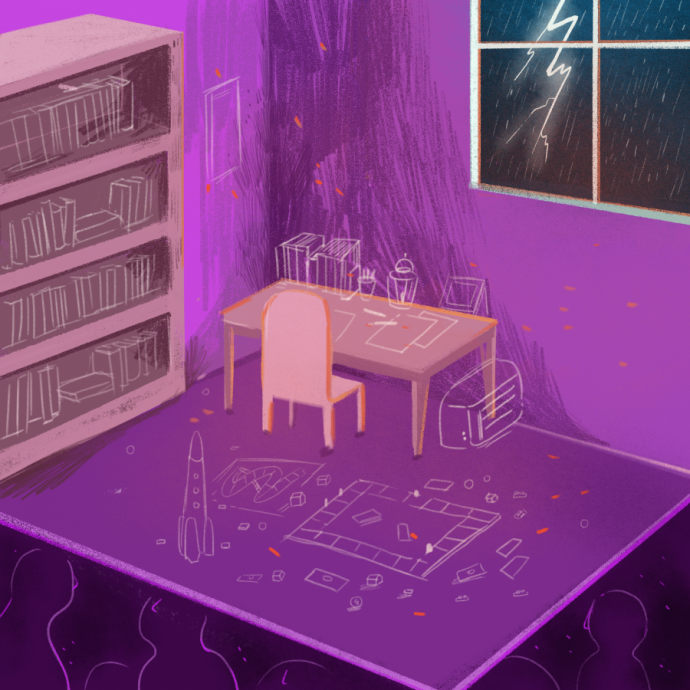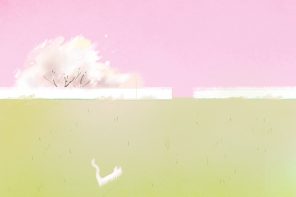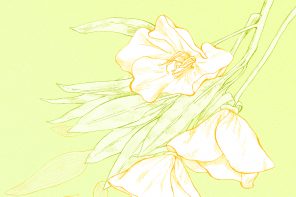You enter the apartment on the sixth floor. Empty. Quiet. Renovated. To hear again, the hushed bustle of each room, the calm laughter, the hum and heave of the narrow hallway. And then, abruptly, that familiar turbulence. You remember it, trapped behind the closed doors of the master bedroom, holding the entire world’s burden. You are 34 years older now.
Here, the gas lantern burning light for homework during endless blackouts. Here, the gas-burning heater warming up a single room during long and early winters. Here, the tall bookcase, hundreds of books, encyclopedias, children’s stories, standing firm and upright, like soldiers against the wall, during a time in Lebanese history when people valued soldiers, valued walls.
Here, entire cities made of Lego; highways, rockets. The shapes and colors of Snakes & Ladders, the toothpaste twists inside marbles of all sizes, and Monopoly and its thin paper money that your eldest brother laminated to last an eon. Suddenly, the toxic smell of adhesive book lamination in September before school began. The toxic smell of burning Katol, that jungle-green coil that meant mosquitoes, meant summer, meant cold watermelon boats, meant balconies, and burned beach skin.
Suddenly the first scent of autumn, its wet earth, bordering this quiet Keserwen street that used to be haunted by only one or two other buildings, and further down the street here, a single grocery store, owned by Em George, who lived in a stuffy windowless backroom, raising a doctor.
At night you hear it again, the thunder breaking the sky, the sky flinging complicated rain against the glass windows, threatening to come in. You remember how you never understood lightning; why all that radiance had to be followed by so much rage.
You enter the kitchen and suddenly the stovetop burns blue fire for coffee or bath water or tomato-based stew. The breakfast dishes fill the sink, and your mother, now decades younger, now taller, is singing a tune or maybe the portable radio is on, to the holy breath of Fayrouz, or classical music, tracks which sounded all the same to you, and, then, the earliest telephone begins to ring in the hallway, it rings and rings, and you turn around and, finally, someone picks up.
Here, in this same kitchen with its mustard-brown refrigerator, you’re trying to carry, like a grown up, the glass oil bottle from the counter to the middle table, but your small hands are shaking because you’re being too careful and you don’t make it in time and the bottle comes crashing down into a thousand million pieces unto the recently washed kitchen floor and the oil spills massive green lakes in every direction and your six-year-old body stiffens, holds its breath, not knowing why it anticipates a cold mean scolding that never comes. It never comes. And now you think maybe your sense of catastrophe, your inexplicable fear, stems from absurdly insignificant moments like these. When what you dread happens, and then it doesn’t.
It is night once again, and the sound of bombing sounds like nothing but bombing, so you run downstairs in your pajamas, holding your mother’s flashlight, your mother gathering your brothers, who resent the interruption of sleep, and you’re at your neighbor’s on one of the lower floors now, where you escaped with all the other neighbors, since there’s no basement, no shelter, to this place, or maybe it’s filled with unmentionables, with echoes and screams, and you’re all piled up now, like cockroaches, in the narrow hallway of bedrooms, on thin mattresses in the middle of the apartment, in the middle of death, your eight-year-old self thinking it’s a party, a break from school the next day and the next and the one after that.
You remember the sinister but often-mentioned term, RPG, on the news, in the neighborhood, among families, Lebanese-ly pronounced arbehjeh, and how, for the longest time, you thought it was a single word, never knew it was a series of letters that stood for rocket-propelled grenade. Here, you are being hushed, being told not to ask questions about whose fault it is, who started and why, it’s not the right time, the right place, who are these people, trust no one. Which accent works best? Here, you remember being looked at in all the wrong ways, followed, touched, ignored, rescued, invisible.
Here, you are standing almost eye-level with the balcony railing, overlooking Harissa, the shrine of Our Lady of Lebanon, when you first arrive to this place, and here, you suddenly wake up one morning and loom over the railing like a giant branch, forgetting forever and remembering at once, how small, how scared, how safe, you really were.
Recipient of the 2019 Edward Stanley award for poetry, Rewa Zeinati is the author of the poetry chapbook, Bullets & Orchids (Corrupt Press, 2013), and the editor of Sukoon magazine. Her work is published in several journals and anthologies including, Prairie Schooner, Guernica, Diode, So To Speak, Grist, Natural Bridge Journal, Quiddity, Mizna, Uncommon: Dubai, Making Mirrors: Writing/Righting by Refugees, Common Boundary, among others.




